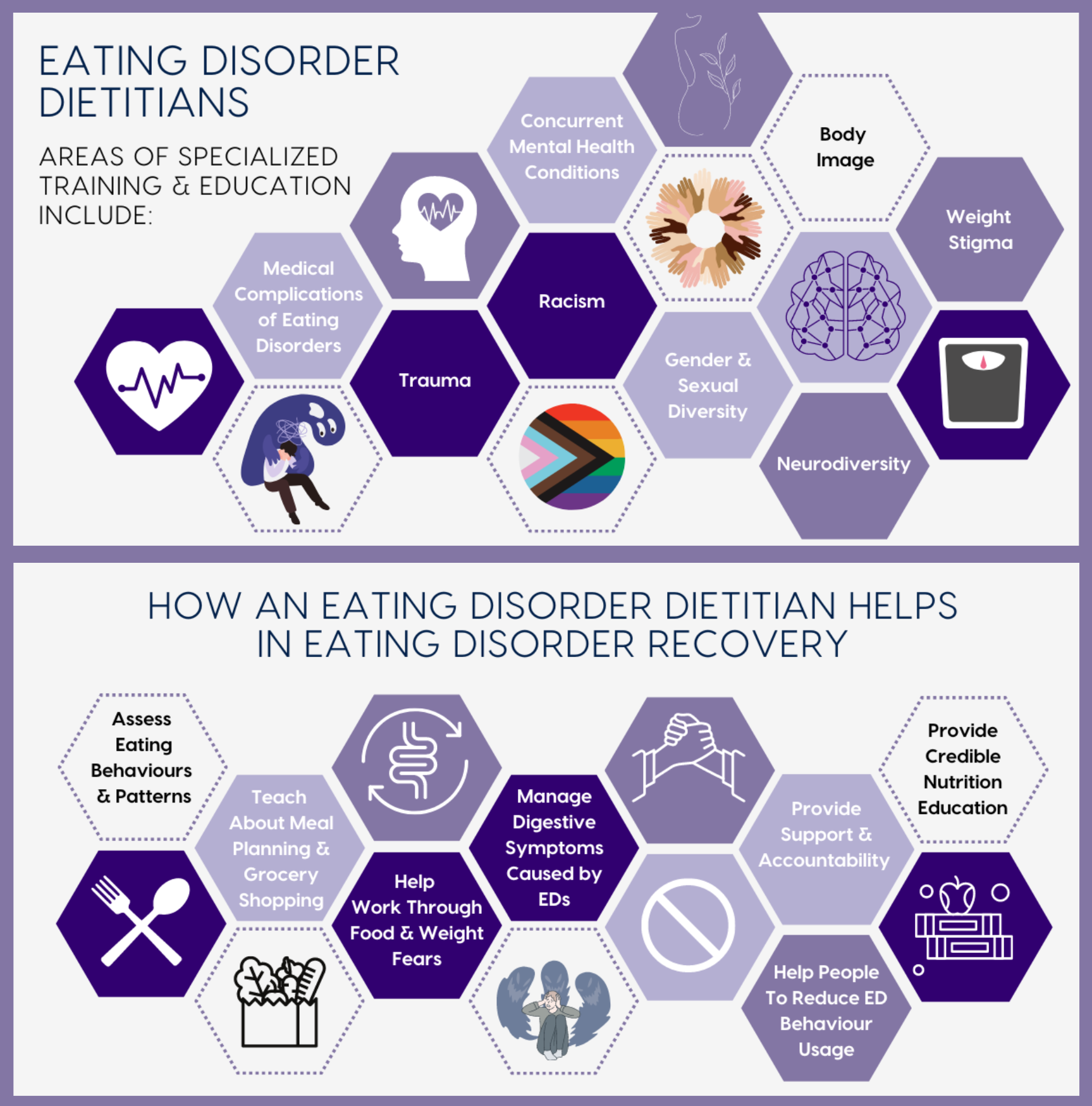Have you been diagnosed with an eating disorder or feel that you may have one? Are you feeling confused and overwhelmed? Are you wondering, “What do I do next? How do I get help?”
It makes sense that you aren’t sure what your next move should be! No one asks for or expects to have an eating disorder.
Your doctor may have suggested that you see a dietitian. Or maybe you’ve done some reading about eating disorder recovery and learned that dietitians can help.
Read on to learn about how Eating Disorder Dietitians receive specialized training and supervision, and how they can help you to reach your eating disorder recovery goals!
What is an eating disorder?
Eating disorders are a complex mental health condition encompassing biological, sociocultural, and psychological components. They are among the deadliest of all mental health diagnoses, second only to opioid overdose [1].
Eating disorder diagnoses include:
- Anorexia Nervosa
- Avoidant Restrictive Food Intake Disorder (ARFID)
- Binge Eating Disorder
- Bulimia Nervosa
- Unspecified and Other Specified Eating Disorders (Disordered eating)
The severity and multi-layered presentation of eating disorders often make them difficult to treat. A specialized treatment team is essential for helping individuals to recover safely.
Who is included in a treatment team?
A typical eating disorder treatment team includes:
- Physician
- Eating Disorder Registered Dietitian
- Regulated Mental Health Professional (e.g., Registered Psychotherapist, Registered Social Worker, Psychologist)
Depending on the person and their needs, there may be additional members on a treatment team, including a psychiatrist, occupational therapist, pelvic floor specialist, and dentist. Members of the treatment team often collaborate to optimize eating disorder treatment outcomes.
What is an Eating Disorder Dietitian?
Registered Dietitians are licensed health care professionals that are trained to help individuals with food and nutrition issues. Many dietitians practice more generally, while others work to become more specialized in a certain area.
An Eating Disorder Dietitian is specialized in the treatment of eating disorders.
Eating disorders are extremely complex, and their nutrition management is very different from other conditions. This means that specialized training is necessary to provide safe and effective care.
Areas of specialized training and education include:
- Medical complications of eating disorders and specific nutrition considerations:
- Eating disorder behaviors like restriction, bingeing, and purging affect the functioning of many bodily systems, including the central nervous system (i.e., brain), digestive system, and endocrine system (i.e., hormones) [2]
- Concurrent Mental Health Diagnoses:
- Most studies estimate the psychiatric comorbidity of eating disorders as around 70% (or higher). Many individuals experiencing an eating disorder have also been diagnosed with, or exhibit symptoms associated with anxiety and mood disorders, depressive disorders, bipolar and related disorders, personality disorders, obsessive-compulsive and related disorders or schizophrenia [2].
- Neurodiversity:
- Sensory processing differences seen in autism, attention-deficit hyperactivity disorder (ADHD) and other neurodivergent identities can make eating more difficult, leading to an increased likelihood of developing an eating disorder [3,4,5].
- Trauma:
- Eating disorders present as being about food and body image, but are actually an attempt to cope with difficult emotions and traumatic experiences. People who have experienced trauma or adverse childhood events are more likely to develop an eating disorder [3].
- Gender & Sexual Diversity:
- The stress, stigma, and discrimination of being a sexual orientation or gender identity minority can increase the risk of developing an eating disorder [3].
- Racism:
- The trauma and systemic inequalities experienced by individuals with marginalized identities puts them at a greater risk for developing an eating disorder. Marginalized individuals are also often less likely to be properly diagnosed with an eating disorder or receive proper treatment [3].
- Weight Stigma:
- Weight stigma and bullying are a form of trauma, and pose a significant threat to psychological and physical health. Indeed, they have been documented as significant risk factors for depression, low self-esteem, and body dissatisfaction. Many individuals with an eating disorder have experienced weight stigma and discrimination.
- Body Image:
- Most individuals with an eating disorder struggle with body image. Fostering body acceptance and confidence is an essential part of eating disorder recovery [3].
- A comprehensive understanding of how these areas affect individuals living with an eating disorder is vital to ensuring optimal eating disorder treatment outcomes.
- Supervision:
- Eating Disorder Dietitians also engage in clinical supervision, during which the Dietitian works with another Eating Disorder Dietitian mentor that has extensive training and experience. This supervision enables the dietitian to work through difficult cases and helps to foster personal and professional growth.
- Not all dietitians engage in supervision but it is a very common practice among Eating Disorder Dietitians due to the complex nature of eating disorders.
- Eating Disorder Dietitians undergo this specialized training and supervision so they can safely help individuals overcome the unique challenges associated with their eating disorders. Just like you wouldn’t see a family doctor for surgery, you shouldn’t see a general dietitian for eating disorder help.
How does an Eating Disorder Dietitian help in Eating Disorder Recovery?
The role of a dietitian in eating disorder treatment depends on the treatment setting (i.e. residential, hospital, community, etc.). In general, an Eating Disorder Dietitian assists in eating disorder treatment in the following ways:
- Assess an individual’s eating behaviours and patterns
- Provide meal planning and grocery shopping guidance and education
- Guide and support individuals with weight restoration (i.e., helping someone who is at a low weight to regain weight)
- Help to manage digestive symptoms caused by eating disorders
- Assist individuals in working through and overcoming food fears and a fear of weight gain
- Help individuals to reduce the use of eating disorder behaviours (i.e., restriction, bingeing, purging, compulsive exercise, etc.) and develop more effective coping mechanisms
- Provide credible nutrition education
- Encourage the individual to externalize the eating disorder and sort through eating disorder thoughts, ultimately helping the person to identify with their recovered self
- Provide rapport, support, and accountability
- Help to reduce stigma and shame related to eating disorders and body image
- Empower individuals and help them to establish a lifelong positive relationship with food, exercise, and body image
- Help individuals to sort through thoughts, feelings and beliefs around food, exercise and body image
- Help teach individuals how to discern fact from fiction on social platforms (i.e., social media, television, etc.)
How do I find an Eating Disorder Dietitian Near Me?
Eating Disorder Dietitians can provide both in-person and virtual eating disorder treatment.
Virtual Eating Disorder Treatment:
Virtual eating disorder treatment reduces barriers to accessing treatment that may be present for in-person treatment, including:
- Geographical proximity to a treatment centre or dietitian specializing in eating disorders
- Scheduling conflicts and time constraints
- Travel time
The frequency and severity of eating disorder symptoms, along with the amount of personal support, will determine if virtual eating disorder treatment is the right fit for you.
If you are located in Canada, visit the National Eating Disorder Information Centre to find an Eating Disorder Dietitian in your province.
If you require hospitalization for your eating disorder, you are encouraged to speak with your medical provider about the treatment programs that are available in your community.
Final Thoughts:
Eating disorders are complex mental health diagnoses that have high mortality rates.
Due to their complexity, it is critical for anyone with an eating disorder or symptoms of an eating disorder to seek help from professionals specialized in eating disorder care. Eating disorder treatment teams typically include a physician, dietitian, and regulated mental health professional.
An Eating Disorder Dietitian undergoes specialized training and supervision in order to be able to provide eating disorder treatment and nutrition counselling. In treatment, Eating Disorder Dietitians provide education and guidance on planning meals , overcoming food fears, working through body image concerns, and much more!
You can work with a Eating Disorder Dietitian virtually or in-person.
Author Bio:
Brittaney Berendsen RD is a trauma-informed, anti-diet, weight inclusive Eating Disorder Dietitian. She is a proud dog mom to a retired racing greyhound and finds that she is fueled by food, forests and fresh air.
She provides virtual eating disorder treatment and nutrition counselling for individuals living with anorexia, bulimia, binge eating disorder, ARFID, and disordered eating. Virtual eating disorder treatment and nutrition counselling is accessible to residents of Ontario.
519 495 6594 | edrdbb@gmail.com | www.edrdbb.com



